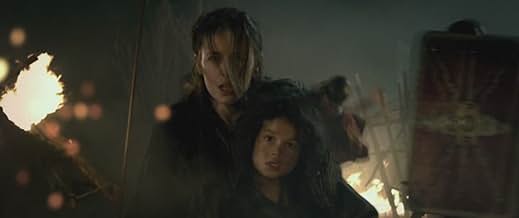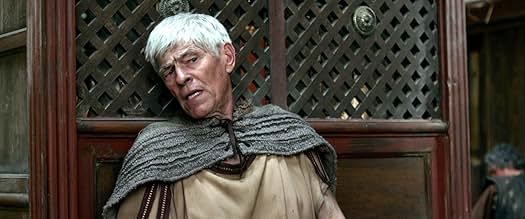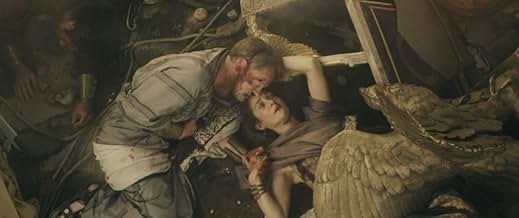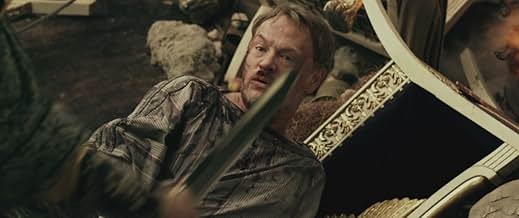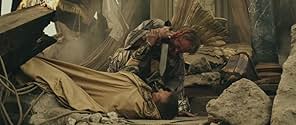Un esclave devenu gladiateur se retrouve dans une course contre la montre pour sauver son véritable amour, qui a été fiancée à un sénateur romain corrompu. Alors que le Mont Vésuve entre en ... Tout lireUn esclave devenu gladiateur se retrouve dans une course contre la montre pour sauver son véritable amour, qui a été fiancée à un sénateur romain corrompu. Alors que le Mont Vésuve entre en éruption, il doit se battre pour sauver sa bien-aimée alors que Pompéi s'effondre autour d... Tout lireUn esclave devenu gladiateur se retrouve dans une course contre la montre pour sauver son véritable amour, qui a été fiancée à un sénateur romain corrompu. Alors que le Mont Vésuve entre en éruption, il doit se battre pour sauver sa bien-aimée alors que Pompéi s'effondre autour de lui.
- Director
- Writers
- Stars
- Prix
- 9 victoires et 4 nominations au total
- Milo's Mother
- (as Rebecca Eady)
Avis en vedette
It's fast paced, has some great action scenes and is an overall pretty decent. Nowhere near as bad as others are making out to be. I wish Emily Browning would make more big budget movies.
Other things I liked:
- The gladiatorial theme is well presented. You can see people who hate being a gladiator, people who are just waiting for their freedom, people who believe they are gods in the arena, and so on, and you can watch how the majority of Romans loved these shows, but some didn't. You can make yourself an idea of the weather of that theme.
- The romance is believable. I mean, it happens very fast, but it's not Disney's "Real Love" They are just two people who LIKE each other caught in the massive chaos of a volcano, not much more.
- the special effects are plain awesome! Not only the gigantic explosion and lava bombs, and tsunamis. Also the small things, like the views of the city in the background, and the aerial shots.
- The city was amazing. People complain "Pompeii is not a port city" Well, actually it WAS, but the eruption changed the shape of the coastline. And the fact that THAT city shown in the movie WAS Pompeii. They actually shoot in place and then recreated the city out of the remainings using CGI. So the grid shape, the walls and everything is in place just as it was 2000 years ago. Archaeologists have in fact praised the director for his recreation of the city
- the volcano. It's the star of the movie without a doubt. It seems to have almost a personality. The way the eruption happened was very close to what actually happened. Some artistic liberties were made for the sake of entertaining. You won't be seeing any clichéd lava river because Mount Vesubius doesn't work that way.
- The ending. It was amazing. I can't spoil it for you, but making it in any other way would have damaged the quality of the film.
- The acting. It was really good for what I was expecting. Milo surprised me a lot, because I could really believe him as a lead man. The girl also. She seemed so plain in photos, but once the movie started I could say she nailed the part perfectly and was by no means just "miss fanservice", as girls in these kinds of movies tend to be. The real surprise was Atticus. The actor totally stealed the movie for himself in every scene, something that was perfect for an invicted champion in the peak of his gladiatorial career.
What didn't I like? The fact that the other famous city in the vicinity of Vesubius(Herculaeum, I think it's called) wasn't showed in the aerial shots. I mean, obviously the movie would be to complicated if we include it in the plot, but an aerial cameo of this other city would have been a fine addition to the movie, and would have improved the accuracy of it.
1. The performance by the main characters was very poor and artificial. 2. The director did a bad job, as did the editor. 3. The main story is weak and uninspired. There are clichés all over the place. Dialogue is poor and boring. The whole story is completely dubious and it is hard to take the movie seriously. 4. Historically speaking, the film sacrifices the real events that occurred for the sake of extra special effects. The fact that two cities were destroyed before anything got to Pompeii is ignored completely. The 'fire rain' on Pompeii also never happened, as did the tsunami. It simply made no sense to add everything but the kitchen sink into this movie. 'The Gladiator' was fictional, but it never claimed to be anything else. This film claims to be based on real events, when it clearly isn't in the most important aspects of what happened that day. In Pompeii, people died because they inhaled the smoke, not because fire rained down on them or tsunamis washed them away. The arena (stadium) was never destroyed by the earhquake and it still stands in Pompeii to this day. Dubious to the extreme.
Overall very very poor.
The above phrase contains all one needs to be aware with regards to Pompeii. Brilliant and breathtaking spectacle marred by superficial storyline.
We live the last days of Pompeii leading to the eruption of Vesuvius. A slave arrives in town in order to fight for his life as part of a spectacle for a senator from Rome. He befriends another gladiator and the daughter of the town's governor falls for him.
On the one hand, a great job has been done to escalate the audiences tension as we await for Armageddon to hit and the visual climax does not disappoint. The effects are spectacular and the destruction is displayed to its full core.
Sadly, whilst these men who were treated like animals and were an object of sport for their slave owners had a chance to escape they put everything to jeopardy for a girl crush who was also part of the system that oppressed them. Had this been presented from the angle of a friendship between two men that were to fight one another to death it would have some resonance but for some cheesy romance it proved a major anticlimax in the otherwise impressive high point leading to sheer indifference as to whether any of them survived or not.
Le saviez-vous
- AnecdotesThe thumbs-up/thumbs-down gestures which stem from gladiatorial events had different if not opposite meanings to what they do today. A down-turned thumb by an official symbolized the winner burying his sword in the sand and the loser's life spared; an upturned thumb expressed delivering the killing stroke, symbolizing a slit throat. The actual gesture remains unknown - our belief in the thumbs-up/down stem from a painting by Gerome (pollice verso - with turned thumb) the surviving descriptions 'Infesto pollice' (with hostile thumb) and 'pollice premere' (with thumb pressed down) are too ambiguous to conclusively state what gesture was used in reality.
- GaffesCorvus has a bust of the Emperor Hadrian on display in his military tent. Hadrian was emperor from AD 117 - 138, and would have only been three years old at the time.
- Autres versionsThe UK release was cut, the distributor was advised that the film was likely to receive a 15 classification but that their preferred 12A classification could be obtained by making some changes. The distributor was advised to reduce stronger moments of violence where there was a dwelling on particular acts and to reduce the emphasis on blood on bladed weapons. When the film was formally submitted, changes had been made which addressed these concerns. Consequently, the film was classified 12A.
- ConnexionsFeatured in Someone Has to Review It!: Pompeii (2014)
- Bandes originalesHouse of Delights
from Spartacus: Gods of the Arena (2011)
Written by Joseph LoDuca
© Starz Entertainment, LLC.
Courtesy of Warner/Chappell Music Canada, Ltd.
Meilleurs choix
- How long is Pompeii?Propulsé par Alexa
- What is Pompeii about?
Détails
Box-office
- Budget
- 100 000 000 $ US (estimation)
- Brut – États-Unis et Canada
- 23 219 748 $ US
- Fin de semaine d'ouverture – États-Unis et Canada
- 10 340 823 $ US
- 23 févr. 2014
- Brut – à l'échelle mondiale
- 117 831 631 $ US
- Durée1 heure 45 minutes
- Couleur
- Mixage
- Rapport de forme
- 2.35 : 1







